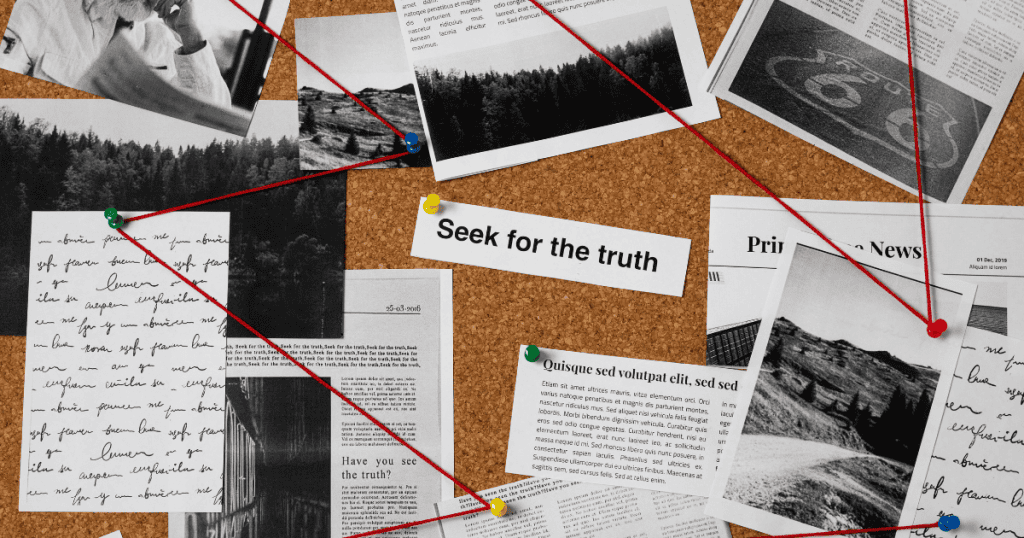You could have them cornered with undeniable proof. They’ll still look you in the eye and deny everything.
I remember the day I finally caught my mother in a contradiction so blatant that even my siblings froze.
She had told one version of a story to my aunt, another to my cousin, and a completely different one to me, all within two days.
I laid the facts out like puzzle pieces on the table.
She didn’t flinch. She didn’t apologize. She didn’t even hesitate.
She simply tilted her head and told me I had “remembered it wrong.”
That was the moment I understood that the truth wasn’t her weakness. Losing control was.
These aren’t just “lies.” They are psychological landmines, forbidden truths guarded like state secrets.
Admitting them would threaten the fragile self-image they’ve spent decades constructing.
You’re about to get classified intel that will give you quiet, strategic superiority.
You won’t need their confession to win. You’ll already know exactly where the cracks are.
Table of Contents
Why Narcissists Will Never Say These Truths Out Loud?

Narcissists depend on one thing above all else: controlling the narrative.
In psychological terms, this is called impression management, a constant effort to control how others perceive them.
The truth is dangerous because it strips them of the ability to rewrite reality in their favor, leaving them exposed and powerless in their own eyes.
Many narcissists engage in cognitive dissonance reduction.
When reality and their self-image clash, they’ll bend, twist, or outright erase facts until the discomfort disappears.
This isn’t just lying. It’s a defense mechanism that protects their fragile sense of self from collapse.
In my toxic family, my mother didn’t just want to be right. She needed to be the author of what “right” meant.
If she admitted fault even once, it meant more than losing an argument.
It meant losing the foundation of her identity, the very scaffolding she stood on.
Understanding these forbidden truths has nothing to do with coaxing an apology.
It’s about recognizing the game for what it is, so you stop reacting on their terms.
From there, you can start moving with clarity, detachment, and quiet control.
5 Forbidden Truths Narcissists Will Never Admit

1. “I Mirror Your Morality to Keep You Off My Trail”
When I was younger, I truly believed my self-centered mother and I shared the same moral compass.
She agreed with my sense of fairness, compassion, and integrity so seamlessly that it felt like we were in perfect alignment.
But slowly, I noticed the cracks.
The very values she preached vanished the moment they stood in the way of something she wanted.
One day, she’d insist on “family first”, then the next, she’d undermine my brother’s confidence just to keep the spotlight on herself.
This is called mirroring.
It’s a psychological tactic where someone reflects your values, speech, and even body language to create a false sense of similarity and trust.
In narcissists, mirroring is strategic camouflage.
They don’t internalize your values. They perform them for relational advantage.
When those values cost them something, they reveal what psychologists call situational morality, a flexible moral code used only when convenient.
Here’s how you can turn this truth to your advantage:
- Test “shared values” in situations where they have something to lose.
- Watch for moral flip-flops. They indicate the mirroring was a mask.
- Avoid moral debates; their “beliefs” are tools, not convictions.
2. “I’m Empty Behind the Smile”

In public, my narcissistic mother could light up a room.
She laughed easily, told captivating stories, and seemed like the life of every gathering.
People loved her.
But in private, it was different. There was a stillness, a kind of emotional vacuum.
She was always restless, always looking for the next distraction.
If she wasn’t basking in admiration, she seemed hollow.
This is narcissistic emptiness, a chronic sense of inner void described in clinical psychology.
It stems from an unstable sense of self, often rooted in early childhood, where love was conditional on performance or compliance.
Because they lack a stable core identity, narcissists need constant external validation to feel “real.”
Without their supply, they face what’s called ego depletion, which is an emotional burnout that leaves them irritable or withdrawn.
This is where you flip their secret into your power:
- Stop trying to “fill” their void. It’s bottomless and not yours to fix.
- Recognize that their charm is often a shield, not a reflection of emotional health.
- When they go quiet or restless, see it as a signal of vulnerability rather than power.
3. “Manipulation Is My Drug”

I can’t count the number of times I ended up apologizing for things I hadn’t even done.
My controlling mom could twist a conversation so fast I’d lose track of what I was defending.
She’d pull in my toxic siblings as witnesses, rewrite past events, or play the wounded victim until I caved.
Manipulation in narcissists often functions like an addiction.
Each successful manipulation provides a dopamine hit, the brain’s reward chemical, reinforcing the behavior.
Over time, they develop tolerance to manipulation and need bigger, more elaborate control tactics to get the same rush.
Common manipulation tactics include gaslighting, where they make you question your reality.
There’s also triangulation, when they pit people against each other to maintain control.
And then there’s guilt-tripping, where they weaponize your empathy against you.
Here’s how to use this knowledge against them:
- Identify their “go-to” tactic and pre-plan neutral responses.
- Keep communication factual and minimal when conflict starts.
- Starve their addiction. No reaction cuts off their reward loop.
4. “I’m Terrified of Losing Control Over My Body”

Narcissists love to project invincibility.
My mother acted like she could handle anything with ease. But I saw the truth one night when she had a sudden health scare.
What flickered across her face wasn’t pain at all, but the terror of losing control.
Later, she obsessively retold the incident in ways that downplayed her fear.
It was as if rewriting the narrative could erase the moment of weakness.
This is linked to mortality salience, which is the awareness of one’s own vulnerability or death.
For narcissists, whose identity depends on dominance and superiority, physical weakness triggers intense anxiety.
They often engage in image management, staying hyper-focused on appearance, vitality, and “power.”
Beneath it all is a desperate attempt to cover up their fear of aging, illness, and dependency.
This obsession can manifest in rigid routines, excessive grooming, or compulsive health “performance” to mask underlying dread.
This is the way to turn their tactics back on them:
- Don’t be intimidated by their “unshakable” image. It’s curated.
- Quietly knowing they have physical vulnerabilities can help you resist fear-based manipulation.
- Understand that their aggression may spike during illness or aging because control feels threatened.
5. “My Control Is Built on Weird Superstitions”

It sounds bizarre, but some of the strangest things I noticed about my mother were her private rituals.
She’d wear the same scarf to every major family meeting, avoid certain phrases, and rearrange furniture before guests arrived.
In her mind, these “lucky” choices protected her from bad outcomes.
Sometimes, she’d even delay important decisions if she felt the “timing” was unlucky, as though fate itself could be negotiated.
This reflects magical thinking. It’s the belief that unrelated actions influence events.
In narcissists, such superstitions act as a control illusion, giving them psychological comfort that they can “tilt” outcomes in their favor.
It’s also tied to locus of control.
Many narcissists have an unstable internal locus, so they cling to external rituals to maintain the feeling of dominance.
Over time, these habits can become almost talismanic, giving them the sense that without them, their grip on situations might slip.
Here’s how to make this truth work in your favor:
- Observe their rituals and note how they react if disrupted.
- Recognize that their authority often rests on irrational mental scaffolding.
- Seeing this fragility helps dismantle the myth of their absolute control.
How to Spot These Truths Without the Confession?

You’ll never get them to admit these secrets out loud, and you don’t need to.
In fact, pressing for a confession often backfires, because it hands them the stage to twist the story and make you doubt yourself.
Instead, you gather proof in patterns, not in their words.
Watch for:
- Value drop-offs: Do morals vanish when it costs them something? This is a red flag that their “principles” are situational, not genuine.
- Charm withdrawal: Does their energy crash without an audience? Narcissistic supply runs dry when no one’s watching.
- Repetition of tactics: Are the same manipulation patterns recycled? Consistency reveals what’s deliberate versus impulsive.
- Stress reactions: Illness, fatigue, or loss of attention often trigger aggression, panic, or withdrawal.
- Behavioral rituals: Do they cling to objects, routines, or phrases before important events? This shows reliance on control illusions.
The goal is not to force a confession. That’s a trap. The real power comes from decoding their behavior like a silent investigator.
Document mental notes or even private journals of patterns you notice.
Validation comes not from their honesty but from your clarity, from seeing the truth without their permission.
The moment you stop needing their version of events, you take away one of a narcissist’s greatest sources of control.
You hold the classified file now.
Quietly, confidently, use it to protect your peace.
Related posts:
- 15 Things That Make Narcissists Absolutely Lose It (Like a Child Without Their Toys)
- Can a Narcissist Be Defeated? Absolutely. But Only If You Play By These Rules
- 5 Things I Say To My Narcissistic Family When They Try To Make Me Feel Bad For Setting Boundaries
- 25 Quotes Narcissists Hate to Hear (Because They’re True)
- My Boundary Rules Narcissists Hate But Can’t Ignore (Why Yours Don’t Work?)


